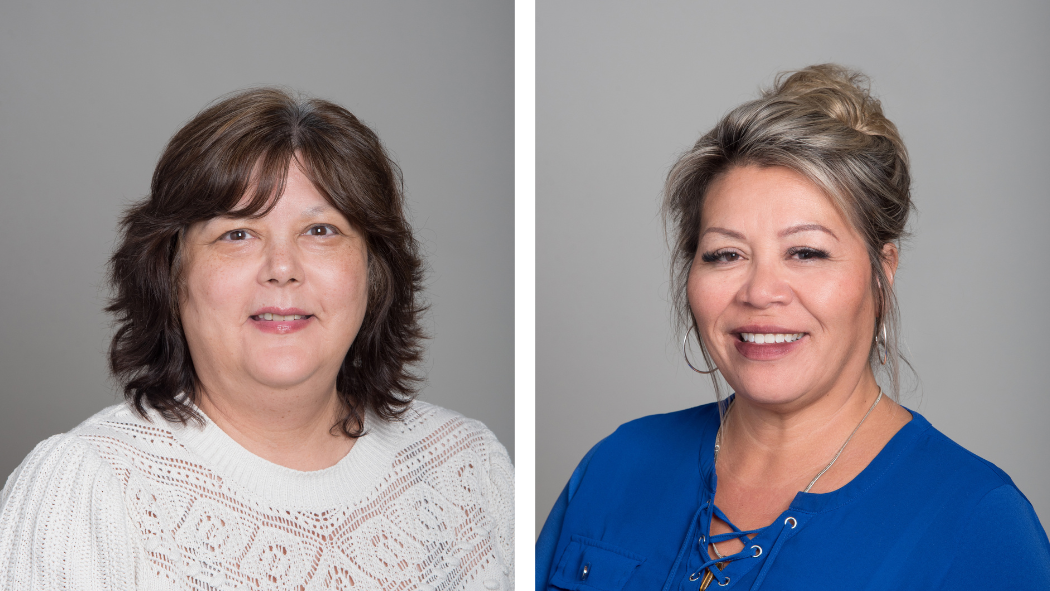
May 31, 2024
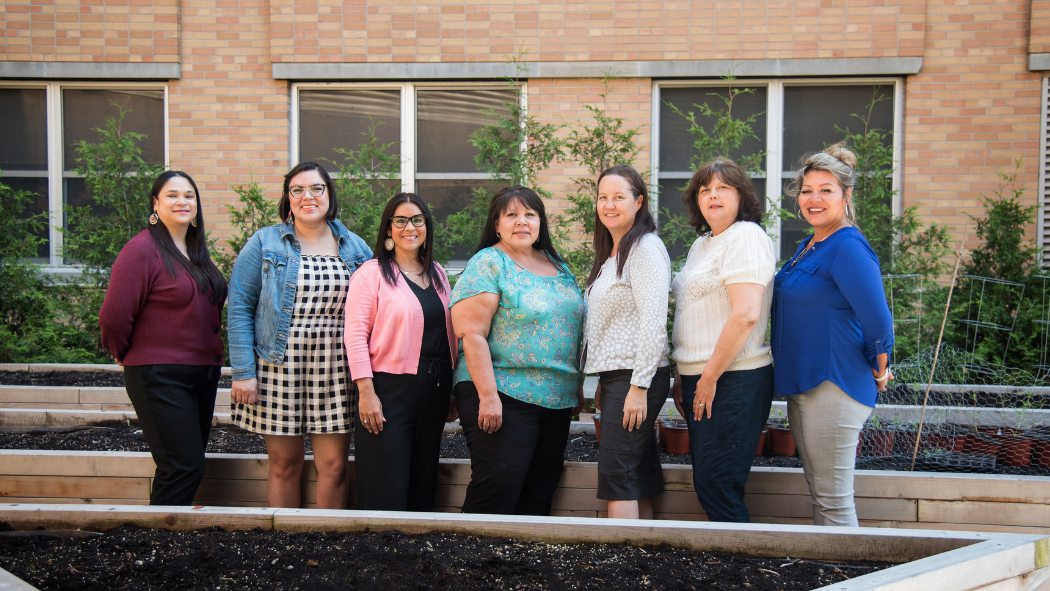
Each year, June is recognized across Canada as National Indigenous History Month. At LHSC, it is a time to honour the diverse cultures of Indigenous Peoples, and celebrate the strength and resilience of Indigenous communities across the nation. This month also represents an opportunity to confront the truths of colonialism, systemic discrimination, and oppression in our ongoing efforts to advance Truth and Reconciliation.
As part of our fundamental commitments, LHSC is working to address barriers that Indigenous patients experience when trying to access and receive care. By engaging community partners, patients, visitors, and Team LHSC, we will continue to build our knowledge and understanding to enhance care experiences, improve health outcomes, and build an environment where Indigenous patients, families and visitors feel safe, valued and welcomed.
Throughout the month, we will be celebrating the work of Indigenous Team LHSC colleagues by featuring their contributions to the health-care system.
South West Regional Cancer Program
Dr. Samantha Boshart, Physician, South West Regional Cancer Program
 Dr. Samantha Boshart is a dedicated family physician and the Regional Indigenous Cancer Lead for the South West Regional Cancer Program (SWRCP). She is also an adjunct professor at the Schulich School of Medicine & Dentistry at Western University.
Dr. Samantha Boshart is a dedicated family physician and the Regional Indigenous Cancer Lead for the South West Regional Cancer Program (SWRCP). She is also an adjunct professor at the Schulich School of Medicine & Dentistry at Western University.
Dr. Boshart’s multifaceted contributions to medicine, education, and community health make her a respected leader and role model in the London community.
As a passionate advocate for First Nations health sovereignty, Dr. Boshart works tirelessly to improve health-care access and outcomes for Indigenous communities. Outside of her professional commitments, she is a devoted mother who enjoys practicing yoga, swimming, and participating in equine sports.
“In our language, we call ourselves Anishinaabe,” said Dr. Boshart. “After forced assimilation, I had to re-learn how to be Anishinaabe and work from my heart to be able to provide the care that is needed for my community. Fortunately, I have been able to witness the best of two knowledge systems and can see a way forward for our Nations to heal and assert health sovereignty. I am humbled and grateful for the opportunity to bring my skills and knowledge to a space where it has not been accessible before.”
Lisa Jackson - Indigenous Resource Consultant/Program Project Coordinator, Indigenous Cancer Program
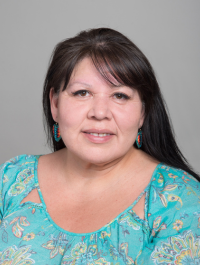 Lisa Jackson comes from Oneida of the Thames First Nation. She is the Indigenous Resource Consultant/Program Project Coordinator for the Indigenous Cancer Program at the SWRCP, and holds a degree in Sociology at King’s University College and a Harm Reduction Certificate from York University.
Lisa Jackson comes from Oneida of the Thames First Nation. She is the Indigenous Resource Consultant/Program Project Coordinator for the Indigenous Cancer Program at the SWRCP, and holds a degree in Sociology at King’s University College and a Harm Reduction Certificate from York University.
Through her work with SWRCP, Lisa engages with regional hospital partners and Indigenous communities with a goal to enact meaningful change. Her areas of focus for this work include building productive relationships, research and surveillance, prevention, screening, palliative and end-of-life care, education and health equity.
With over fifteen years of experience in working with addictions and mental health, Lisa’s career has included working with a local political territorial organization representing seven First Nations in Ontario and in a women’s and family shelter in London.
“I have some great mentors, Elders and family to guide me on my journey. As I have grown, I have come to understand more about the gifts/medicine that I carry,” said Lisa. “I am from the Bear Clan, who are known for their skills in medicine and healing. It is this knowledge which leads my work as I strive to affect positive change and transform the health-care system for Indigenous peoples and future generations.”
South West Regional Renal Program
Heather Talbot, Indigenous Lead, South West Regional Renal Program
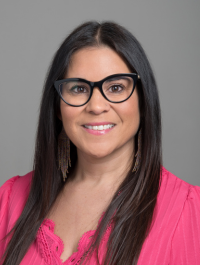 Heather Talbot is Anishinaabe Kwe from Sheguiandah First Nation on Manitoulin Island in Northern Ontario. After starting her career as a nurse, Heather is now the Indigenous Lead in the South West Regional Renal Program at LHSC.
Heather Talbot is Anishinaabe Kwe from Sheguiandah First Nation on Manitoulin Island in Northern Ontario. After starting her career as a nurse, Heather is now the Indigenous Lead in the South West Regional Renal Program at LHSC.
While much of her work involves providing education to Team LHSC, she is also responsible for supporting and advocating for Indigenous patients and caregivers. Currently, Heather is working on developing and implementing renal screening and disease prevention programs unique to each First Nation local to the area.
"I think that it is important to take a wholistic approach to health care,” said Heather. “We should be taking care of each patient’s mental, spiritual, emotional, and physical needs. This means we need to braid Western medicine with traditional Indigenous methods of healing to care for Indigenous patients in the best way possible.”
Indigenous Health and Patient Navigators
Andrea Racette, Indigenous Health Navigator, Victoria Hospital
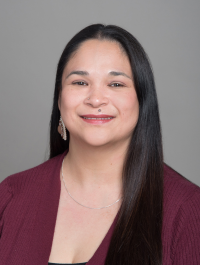 Andrea Racette is a Cree Métis woman, mother and aunty from Duck Lake, Saskatchewan in Treaty 6 territory. At LHSC, she works in Victoria Hospital’s Emergency Department as an Indigenous Health Navigator.
Andrea Racette is a Cree Métis woman, mother and aunty from Duck Lake, Saskatchewan in Treaty 6 territory. At LHSC, she works in Victoria Hospital’s Emergency Department as an Indigenous Health Navigator.
With over 19 years of nursing experience, Andrea has worked in various health-care settings, including long-term care, complex care, and inpatient rehabilitation. Her passion for improving care experiences and health outcomes for Indigenous patients has led to five years of work with the Southwest Ontario Aboriginal Health Access Centre.
“My goal as an Indigenous Health Navigator is to see what patients and fellow Indigenous community members need and let that guide my work,” said Andrea. “I also strive to create relationships with patients and local Indigenous community agencies to help build trust as the organization advances work on reconciliation efforts. I am thrilled to be part of Team LHSC!"
Audra Stonefish, Indigenous Health Navigator, University Hospital
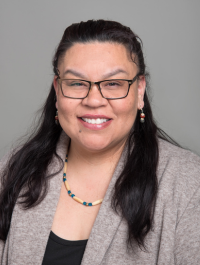 Audra Stonefish is a proud member of the Oneida Nation of the Thames who works as the Indigenous Health Navigator in University Hospital’s Emergency Department. With 12 years of frontline and leadership experience in harm reduction, she aims to enhance patient experiences by offering trauma-informed care.
Audra Stonefish is a proud member of the Oneida Nation of the Thames who works as the Indigenous Health Navigator in University Hospital’s Emergency Department. With 12 years of frontline and leadership experience in harm reduction, she aims to enhance patient experiences by offering trauma-informed care.
Prior to working in harm reduction, Audra earned a Bachelor of Environmental Science degree, studying traditional plant and aquatic ecosystem knowledge at the Standing Rock Sioux Reservation in North Dakota and the Palo Verde National Park in Costa Rica.
Through her many experiences, she has come to learn that harm reduction, Indigenous culture, and traditional plant and ecosystem knowledge complement one another, but require at least three of the seven Grandfather Teachings applied at the base to be successful.
Audra also has a passion for listening to people and learning about their journeys, identifying gaps in service, and building creative solutions that will have long-term impacts.
“When we can accept each other for who we are and where we are, the opportunity for growth is significant,” said Audra. “We each have a role to play, and I am honored to be part of the solution as an Indigenous Health Navigator at LHSC.
Rachel Sutherland, Indigenous Patient Navigator, Verspeeten Family Cancer Centre at LHSC
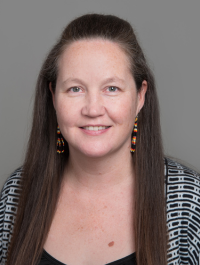 Rachel Sutherland is a member of Sturgeon Lake Cree Nation in Alberta who is passionate about language revitalization and connecting with Indigenous culture. Through her work as the Indigenous Patient Navigator for the Indigenous Cancer Program at the Verspeeten Family Cancer Centre at LHSC, Rachel supports and advocates for First Nations, Métis, Inuit, and Urban Indigenous patients and their families as they navigate through their cancer journey.
Rachel Sutherland is a member of Sturgeon Lake Cree Nation in Alberta who is passionate about language revitalization and connecting with Indigenous culture. Through her work as the Indigenous Patient Navigator for the Indigenous Cancer Program at the Verspeeten Family Cancer Centre at LHSC, Rachel supports and advocates for First Nations, Métis, Inuit, and Urban Indigenous patients and their families as they navigate through their cancer journey.
Each day, Rachel provides patient-centred care by coordinating access to in-home and hospital cancer services, spiritual and cultural care, patient resources, and discharge planning. She is currently working towards completing her degree in Thanatology at King’s University College to become a better advocate for people facing life-limiting diagnoses.
Children’s Hospital
Nicole Yawney, Youth Indigenous Wellness Consultant, Children’s Hospital
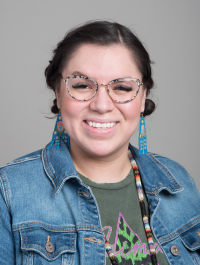 Nicole Yawney, or Little Bear of Fishing Lake First Nation in Treaty Four Territory, is the Youth Indigenous Wellness Consultant at Children’s Hospital at LHSC. She is a Registered Social Worker with a Bachelor of Social Work degree from the University of Regina and a Master of Social Work degree from King’s University College at Western University.
Nicole Yawney, or Little Bear of Fishing Lake First Nation in Treaty Four Territory, is the Youth Indigenous Wellness Consultant at Children’s Hospital at LHSC. She is a Registered Social Worker with a Bachelor of Social Work degree from the University of Regina and a Master of Social Work degree from King’s University College at Western University.
In her role, Nicole spends much of her time supporting the mental health and cultural wellness of Indigenous patients, and in 2022, she received the Canadian Impact Award for her work. She has also led the Realizing Indigenous Spaces project, which will see Indigenous art and healing rooms installed throughout Children’s Hospital at LHSC and co-led the Youth Indigenous Career Fair and Land Based Healing/Nature Prescriptions initiative.
“My parents, grandparents, and great grandparents are residential and day school survivors,” said Nicole. “Every day, I am inspired by my family's strength, personal growth, and dedication to community. I strive to bring this inspiration to my work so that I can help ensure that Children's Hospital is serving Indigenous paediatric patients, families, visitors, and members of Team LHSC in the best way possible.”
Learn more about the Youth Indigenous Wellness Program and Children’s Hospital at LHSC.
The Office of Indigenous Health
Colleen Jewell, Administrative Partner, Office of Indigenous Health
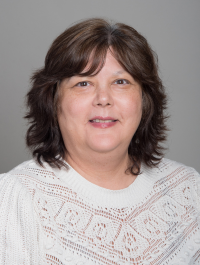 Collen Jewell is Bear Clan from Oneida of the Thames, who works as an Administrative Partner in the Office of Indigenous Health at LHSC. She completed the Medical Office and Laboratory Assistant Program and worked in this role before joining Team LHSC 18 years ago.
Collen Jewell is Bear Clan from Oneida of the Thames, who works as an Administrative Partner in the Office of Indigenous Health at LHSC. She completed the Medical Office and Laboratory Assistant Program and worked in this role before joining Team LHSC 18 years ago.
Colleen has worked in many different capacities during her time with LHSC, having most recently served in Medical Imaging before accepting her current position. She is passionate about improving the health-care experiences of Indigenous patients, families and visitors, and looks forward to making a difference with the Office of Indigenous Health.
“I am proud to be working in the Office of Indigenous Health at LHSC,” said Colleen. “The work we do here is critical, and an important part of that work is building relationships and trust with Indigenous patients, families, and communities to show that the organization is committed to meeting their needs.”
Chantel Antone, Senior Director, Office of Indigenous Health
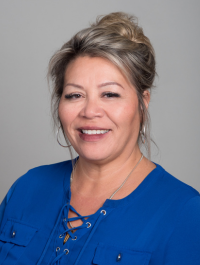 Chantel Antone is Bear Clan from the Oneida Nation of the Thames, whose career in Indigenous Health spans more than 20 years. As the Senior Director of the Office of Indigenous Health at LHSC, she is responsible for leading and developing the Indigenous Health strategy for the organization to achieve better health outcomes for Indigenous patients, families and communities. This work includes leading the Indigenous Health Team; developing a strategy based on the needs of First Nations, Métis, Inuit, and Urban Indigenous Peoples; and guiding LHSC as we explicitly address the harmful impacts of colonialism while advancing Truth and Reconciliation.
Chantel Antone is Bear Clan from the Oneida Nation of the Thames, whose career in Indigenous Health spans more than 20 years. As the Senior Director of the Office of Indigenous Health at LHSC, she is responsible for leading and developing the Indigenous Health strategy for the organization to achieve better health outcomes for Indigenous patients, families and communities. This work includes leading the Indigenous Health Team; developing a strategy based on the needs of First Nations, Métis, Inuit, and Urban Indigenous Peoples; and guiding LHSC as we explicitly address the harmful impacts of colonialism while advancing Truth and Reconciliation.
Recognized nationally for her leadership, Chantel has worked with the National Roundtables on Missing and Murdered Indigenous Women and Girls, the Canadian Association of Nurses in Oncology for under/never served populations, and the Registered Nurses’ Association of Ontario as an expert panel member for their Best Practice Guidelines for Transitions of Care.
